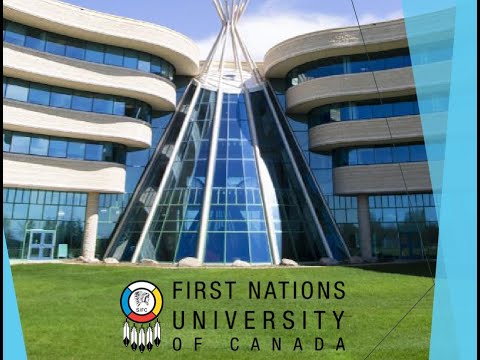Total undergraduates
1,200
International tuition fee
$20,000
School address
1301 CENTRAL AVE
Online or distance education
Yes
Conditional admission
Yes
Number of graduate students
350
Number of undergraduate students
400
Accomodation
School-owned
Quick facts about our school
First Nations University of Canada (FNUniv) is a unique post-secondary institution located in Regina, Saskatchewan, with campuses in Saskatoon and Prince Albert. It is the only university in Canada that offers academic programs rooted in First Nations culture and languages, providing a supportive and culturally sensitive environment for Indigenous students. FNUniv offers a wide range of undergraduate and graduate programs in areas such as Indigenous studies, education, arts, and business, with a focus on Indigenous knowledge and perspectives.
The university's faculty and staff are dedicated to promoting Indigenous ways of knowing and learning, and FNUniv serves as a hub for preserving and revitalizing Indigenous languages and cultures. Students at FNUniv have the opportunity to engage with Elders and knowledge keepers, participate in community-based research, and develop the skills and knowledge needed to contribute positively to Indigenous communities. FNUniv plays a crucial role in advancing Indigenous education and research in Canada and is committed to decolonizing education and empowering Indigenous voices and perspectives.
School highlights
Life at our school
Life at First Nations University is rich with culture, history, and community. Students have the opportunity to learn about Indigenous traditions, languages, and teachings while pursuing their academic goals. The campus celebrates events such as Indigenous Peoples' Day, powwows, and cultural workshops, fostering a strong sense of identity and pride among students.
The supportive and close-knit community at First Nations University creates a welcoming environment for students to thrive academically, socially, and culturally. Faculty and staff are dedicated to providing personalized support and resources to help students succeed. The campus also offers various Indigenous student services, such as Elder guidance, cultural programming, and tutoring, to ensure students have the tools and support needed to excel in their studies and embrace their heritage.
First Nations University of Canada is a unique institution that offers a culturally rich and supportive environment for Indigenous students. With campuses in Saskatchewan, this university is dedicated to the preservation and promotion of Indigenous knowledge and traditions. The faculty and staff at First Nations University are committed to providing quality education and empowering students to become leaders in their communities. With a focus on Indigenous perspectives and teachings, this university offers a truly transformative learning experience for all who attend.
At First Nations University, sustainability is a core focus that guides all aspects of campus life. The university is committed to promoting a sustainable future by incorporating traditional Indigenous knowledge and practices into its curriculum, research, and operations. This includes initiatives such as promoting renewable energy sources, implementing waste reduction and recycling programs, and engaging the community in sustainable practices. Through these efforts, First Nations University is not only preparing students for a future where environmental stewardship is paramount but also contributing to the overall well-being of the planet for generations to come.
The overview vision at First Nations University is to foster Indigenous knowledge, languages, and cultures through quality education, research, and community engagement. This vision aims to empower Indigenous communities and individuals by providing opportunities for self-determination, education, and leadership development.
- Promote Indigenous knowledge and languages
- Empower Indigenous communities through education
- Support research and community engagement
- Foster leadership development
- Provide opportunities for self-determination
First Nations University of Canada offers a unique and enriching campus experience for students. With its focus on Indigenous knowledge, languages, and cultures, the university provides a supportive and inclusive environment for Indigenous and non-Indigenous students alike. The campus is vibrant and welcoming, with cultural events, workshops, and ceremonies that celebrate and honor First Nations traditions. Students have the opportunity to learn from knowledgeable and experienced Indigenous faculty members, who bring a deep understanding of Indigenous perspectives to their teaching. The campus also offers support services, such as counseling and tutoring, to ensure that students have the resources they need to succeed in their academic and personal journeys. Overall, the campus experience at First Nations University is one that fosters growth, understanding, and respect for Indigenous cultures and teachings.
Programs offered at our schools
First Nations University of Canada (FNUniv) offers a wide range of programs for both undergraduate and graduate students. At the undergraduate level, students can choose from various Bachelor's degree programs such as Indigenous Studies, Social Work, Education, Business Administration, and more. These programs combine academic studies with Indigenous knowledge and perspectives to provide a unique learning experience.
For graduate students, FNUniv offers Master's and Doctoral programs in Indigenous Studies, with a focus on research and community engagement. These programs aim to further develop students' understanding of Indigenous issues and empower them to become leaders in their fields. In addition to degree programs, FNUniv also provides certificate and diploma programs in areas such as Indigenous Governance and Cree Language. Overall, the diverse range of programs at First Nations University of Canada reflects its commitment to Indigenous education and cultural revitalization.
First Nations University of Canada is a unique post-secondary institution that offers Indigenous-focused programs and learning experiences. Admission to First Nations University is open to both Indigenous and non-Indigenous students, providing a welcoming and inclusive atmosphere for all learners. Prospective students can apply to the university through an online application process, where they can select from a variety of programs ranging from Indigenous Studies to Social Work to Business Administration. With a strong emphasis on Indigenous culture, language, and traditions, First Nations University strives to create a supportive and culturally enriching environment for all students to succeed academically and personally.
As an intelligent assistant, I can provide information about the undergraduate admissions process at First Nations University. First Nations University is committed to providing educational opportunities for Indigenous students and promoting an inclusive learning environment. Prospective undergraduate students can apply for admission by completing the online application form, providing official transcripts, personal statements, and letters of recommendation. In addition to academic qualifications, the university also considers applicants' cultural background and commitment to Indigenous values and traditions. The admissions committee at First Nations University carefully reviews each application to ensure that students are prepared to succeed in their chosen program of study and contribute to the university community.
First Nations University of Canada is committed to providing a high-quality education for Indigenous students while promoting Indigenous knowledge, languages, and cultures. The undergraduate admissions process at First Nations University takes into account various factors, including academic achievement, community involvement, and cultural connection. Prospective students are encouraged to submit their application along with any required documents, such as transcripts and reference letters, in order to be considered for admission. The university offers a supportive and inclusive environment for students to grow and learn, making it an ideal choice for those seeking to further their education within a culturally relevant setting.
The admission process for the Graduate programs at First Nations University of Canada typically involves the following steps:
1. Completion of a bachelor's degree from a recognized institution.
2. Submission of official transcripts from all post-secondary institutions attended.
3. A minimum GPA requirement, usually 70% or higher.
4. Letter of intent or personal statement explaining the applicant's academic and career goals.
5. Letters of recommendation from academic or professional references.
6. Some programs may require a resume or curriculum vitae.
7. Proof of English language proficiency for international applicants.
8. Application fee payment.
Please note that specific requirements may vary depending on the program and may be subject to change. It is recommended to check the university's official website or contact the admissions office for the most up-to-date information.
First Nations University of Canada (FNUniv) is a unique and innovative institution dedicated to the study and promotion of Indigenous culture, languages, and knowledge. To be admitted to FNUniv, students must meet specific admission requirements. These include a high school diploma or equivalent, with specific course prerequisites depending on the program of study. Additionally, applicants may need to demonstrate proficiency in English or another language, through standardized tests such as the TOEFL or IELTS. FNUniv also considers factors such as academic performance, letters of recommendation, and personal statements when evaluating applications. Prospective students are encouraged to consult the university's admissions website for specific details on program requirements and deadlines.
The admission deadline at First Nations University of Canada varies depending on the program and the semester. Typically, the deadline for the fall semester is in early June, while the deadline for the winter semester is in early November. It is important for prospective students to check the specific admission deadlines for their desired program and semester to ensure they submit all required documents and applications on time. Meeting the admission deadline is crucial for consideration into the university and allows students to plan their academic journey effectively. It is recommended that students prepare their application well in advance to avoid any last-minute issues and to give themselves the best chance of being accepted to First Nations University.
First Nations University of Canada offers various scholarships and financial aid options to support Indigenous students in pursuing their education. These opportunities include entrance scholarships, bursaries, and awards that are specifically designed to help students cover the costs of tuition, books, and other educational expenses. Additionally, the university collaborates with external organizations and sponsors to provide additional funding opportunities for students.
The scholarships and financial aid at First Nations University aim to reduce financial barriers and ensure that Indigenous students have access to quality education and resources to succeed in their academic pursuits. Students are encouraged to explore the different funding options available and to reach out to the university's financial aid office for assistance in navigating the application process.
-
International students
-
Canadian students
-
Provincial students
Notes for the international students
See scholarships and other financial award programs on our website Also, see employment opportunities available to our international students
Keep in mind that the above are just rough estimates; the actual tuition fees vary widely, depending on many factors For a better estimate for YOU, please contact us
Managing finances as a student at First Nations University is essential for maintaining financial stability and achieving your academic goals. One important step is to create a budget outlining your income and expenses, including tuition, books, rent, food, transportation, and any other necessary expenses. By tracking your spending and sticking to your budget, you can avoid overspending and ensure you have enough money for all your needs.
Another tip is to explore student discounts and financial aid options available at First Nations University. This could include scholarships, grants, and bursaries that can help alleviate the financial burden of tuition and other expenses. Additionally, consider part-time work or work-study programs to earn extra income while balancing your studies. By being proactive and responsible with your finances, you can better focus on your education and future success at First Nations University.
At First Nations University, students have the option to work both on-campus and off-campus while studying. On-campus jobs may include positions within the university such as library assistants, administrative support staff, or research assistants. These opportunities allow students to earn money while gaining valuable work experience related to their field of study.
Additionally, students can also seek off-campus employment in various industries such as retail, hospitality, healthcare, or customer service. Off-campus jobs can provide students with flexible work schedules that accommodate their academic commitments. Many students choose to work part-time during the school year and full-time during breaks to help cover the costs of tuition, living expenses, or other personal responsibilities.
First Nations University recognizes the importance of balancing work and academics, and offers resources such as career services and job listings to support students in finding employment opportunities that align with their goals and schedules. With a proactive attitude and time management skills, students can successfully navigate the demands of work and study while attending First Nations University.
Where does the financial assistance come from? Universities, the federal, provincial and territorial governments, individual schools, some businesses and charitable foundations give out bursaries and scholarships. Amazingly enough, over 100,000 scholarships are awarded every year, with many millions of dollars of available funds still going unclaimed because no one applies. Whether you are Canadian or an International student, you can apply for Bursaries and Sponsorships for a range of undergraduate, graduate, doctoral and post-doctoral courses at a wide range of universities so why not check with your chosen school when you apply?
If you are looking for a scholarship or financial aid for your studies, there are literally hundreds of online sources, with both government funding and private funds available. What you don’t want to fall victim to is some sort of scam, which may ask you to pay for the service of applying for a scholarship or even asking you for some sort of deposit. Here are some useful tips if you want to avoid scamming altogether.1- Remember - no authorised and responsible institution will charge you anything for enquiring about financial aid, or for applying for funds. 2- Money up front/ Application Fee - Never send money up front for an application fee - if you are asked to do so, this is definitely a scam!.3- Loan Fees - When applying for a loan, if a company asks you for a loan fee before they will release the money to you, don't go through with it. Companies add fees to your loan balance and would never ask you to pay upfront.4- Guaranteed Scholarships - There is no such thing as a guaranteed scholarship and any company that says they will guarantee you one on payment of a fee will never get back to you. 5- Company/ Scholarship Names - If you see a scholarship service or company that is using words like 'official', 'national', 'government' or other governmental or official sounding names be careful. They are most probably trying to sound official to cover up the scam.6- Phishing schemes - It may be that you get an email, a phone call or an SMS message, asking you for details like your name, address, social security number etc, along with a link to an application form on a website. This is actually a “phishing site” designed to steal your information. In general, you should never give your personal details to anyone, unless you trust them implicitly!.7- Lottery-based scholarships - If you are asked to complete a survey in return for entry into a prize draw (the prize being a scholarship) be very careful. The company providing the scholarship is making money off the information you provide by selling it to third parties. Your chances of winning are very slim and are not based on merit.8- Ask yourself, 'Is it too good to be true?' Although you may want to believe that your dream has just come true, use your common sense and do some research on the organisation involved.9- In general, never pay money - Things like application fees and service fees will be free for legitimate scholarships and you will never be asked to pay money.10- Check them out - If you have a scholarship offer that is asking for money up front, contact them personally. Real companies will be transparent in their services, location etc while scammers will usually be hard to get hold of.Lastly, always make sure that you are applying to an authorised university and that you go through their official channels when you send your personal details. You can find a comprehensive list of secondary education institutions on UniRank
Studying at First Nations University entails various financial considerations, including tuition fees, textbooks, accommodation, and daily living expenses. As a student, it is crucial to create a comprehensive budget and explore potential financial aid options such as scholarships, grants, and bursaries specific to Indigenous students. Additionally, it is advisable to seek guidance from the university's financial aid office to explore potential funding opportunities, work-study programs, and student loans to help cover the cost of education. Proper financial planning and budgeting can help alleviate the financial burden of studying at First Nations University and ensure a successful academic journey.
At First Nations University of Canada, entrance scholarships are available to support Indigenous students in pursuing their post-secondary education. These scholarships are awarded based on academic achievement, leadership potential, community involvement, and financial need. By providing financial assistance to deserving students, the university aims to encourage Indigenous youth to pursue higher education and achieve their educational goals. The entrance scholarships at First Nations University are a valuable resource for students seeking to further their education and make a positive impact in their communities.
At First Nations University of Canada, entrance scholarships are available to support new students with outstanding academic achievement, leadership potential, and community involvement. These scholarships are awarded to incoming students who demonstrate a strong commitment to their education and show promise in their chosen field of study. The entrance scholarships serve as a form of recognition for the hard work and dedication of these students, providing them with financial support to help offset the costs of their education. By offering entrance scholarships, First Nations University aims to attract and retain talented individuals from diverse backgrounds, fostering a culture of academic excellence and community engagement within the university.
At First Nations University of Canada (FNUniv), merit scholarships are awarded to students based on their academic achievements and contributions to their community. These scholarships recognize students who have demonstrated outstanding academic performance and leadership skills. The average percentage required to be eligible for a merit scholarship at FNUniv can vary each year and is contingent upon available funding and the number of qualified applicants.
Students are encouraged to maintain a high GPA and actively participate in extracurricular activities or community service to increase their chances of receiving a merit scholarship. FNUniv is committed to supporting students in their academic pursuits and provides various scholarship opportunities to help alleviate the financial burden of pursuing higher education.
At the First Nations University of Canada, scholarships play a crucial role in supporting Indigenous students in pursuing their education and advancing their academic goals. These scholarships are often made possible by generous donors who are committed to empowering Indigenous individuals and communities through education. Donors may come from various backgrounds, including corporations, foundations, individuals, and alumni who believe in the importance of supporting Indigenous students on their educational journey. These scholarships not only provide financial assistance to students but also recognize their achievements and help build a sense of community within the university.
By investing in scholarships at the First Nations University, donors contribute to breaking down barriers to higher education for Indigenous students and supporting their academic success. These scholarships can make a significant difference in the lives of students by enabling them to access resources, mentorship, and opportunities that can help them thrive academically and beyond. Through their support, donors play a vital role in fostering a culture of achievement, resilience, and empowerment among Indigenous students at the First Nations University of Canada.
At First Nations University, scholarships serve as a vital tool in promoting access to education for Indigenous students and supporting their academic pursuits. These scholarships are intended to alleviate financial barriers and enable students to fully engage in their studies without having to worry about the burden of tuition fees. The purpose of scholarships at First Nations University is to empower Indigenous students to achieve their educational goals, foster academic excellence, and promote the values of cultural preservation and community leadership. By investing in scholarships, the university aims to create more opportunities for Indigenous individuals to thrive in higher education and contribute meaningfully to their communities and society at large.
The purpose of scholarships at First Nations University is to support and empower Indigenous students in their pursuit of higher education. These scholarships provide financial assistance to students who may not have the means to afford tuition and other expenses associated with attending university. By offering scholarships, the university is able to attract and retain talented Indigenous students, ensuring that they have the opportunity to achieve their academic and career goals.
In addition to financial support, scholarships at First Nations University also serve to recognize and celebrate the achievements of Indigenous students. This recognition can help boost self-esteem and motivation, inspiring students to continue excelling in their studies. Overall, scholarships at First Nations University play a crucial role in promoting access to education and supporting Indigenous students in their academic journeys.
First Nations University of Canada is located in Regina, Saskatchewan, Canada. For contact information, you can reach the admissions office at 1-306-790-5950. Additionally, you can visit the university's website at www.fnuniv.ca for more information on programs, admissions requirements, and other inquiries.
The university's physical address is at 1 First Nations Way, Regina, Saskatchewan, S4S 7K2, Canada. If you prefer to email your inquiries, you can contact them at info@fnuniv.ca. The university welcomes inquiries from prospective students, parents, and the community, and they are dedicated to providing support and information to help students navigate their programs and services.





